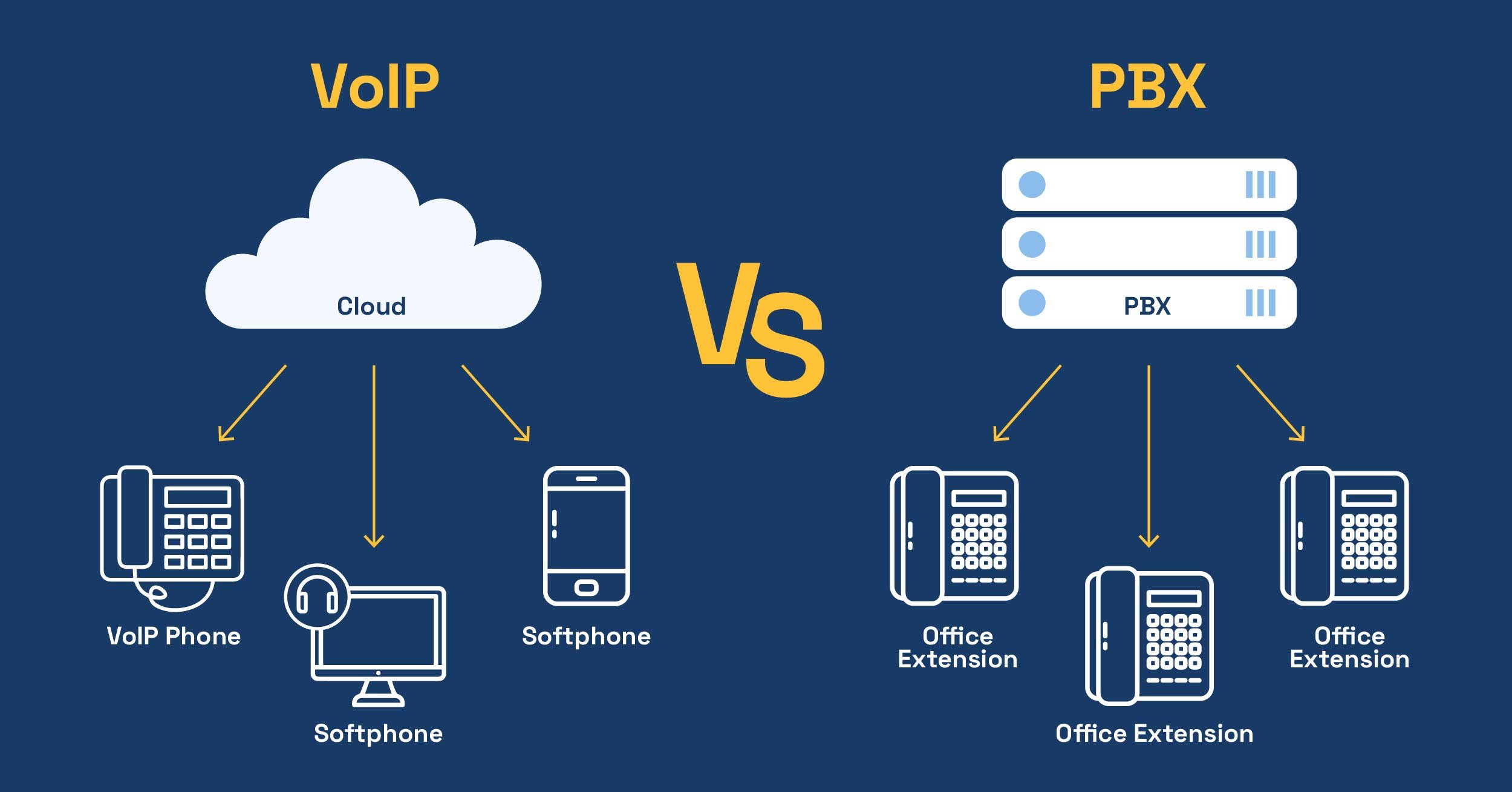A lot of organizations have put off updating their phone system, and I understand why. We’re more creatures of habit about our phones, updating these systems can be time-consuming, and new voice calling technology has muddied the water. Add all of these up, and it’s really easy to keep kicking this upgrade down the road.
Sometimes, organizations put this one off for so long that they are forced to adopt a new voice-calling solution very quickly. That’s never a great situation to be in, so if you’re in the market for a new phone system, this blog’s for you.
PBX vs. Cloud — What Are the Differences?

Technology acronyms save tech folks time, but I understand that they can make life frustrating for anyone outside our industry. So, before I compare these phone systems, I wanted to take a few moments to clarify both terms.
Private Branch Exchange
A PBX, or private branch exchange, in some form, has existed in offices since the telephone was introduced. You’ll have a box in your office that connects internal devices to external lines and facilitates other basic functions, like call holding and forwarding. And because this equipment is on-premises, your IT team will be responsible for any necessary management and maintenance.
Voice over Internet Protocol
VoIP phone systems rely on the internet instead of old-fashioned landlines. But while you might choose to have desk phones and traditional-looking handsets, you certainly don’t need them, and you won’t need the box. Your VoIP provider will be responsible for maintaining and upgrading your system, and you’ll pay for their services through a monthly subscription.
Cloud Voice
Cloud voice and VoIP are often used interchangeably, and for most intents and purposes, that’s fine. But a better way to understand these two terms is to understand their relationship to each other. Cloud voice providers use VoIP technology in order to provide their service.
Pros and Cons of PBX Phone Systems

PBX systems may be a little old-school, but there’s a reason they still make the grade for a lot of organizations.
6 Pros of PBX Systems
Because PBX systems rely on physical connections between all devices within the network, and you own your own equipment, they have a few advantages that are tough to beat:
- They’re more reliable
- They’re more customizable
- Your staff’s probably more familiar with using this technology
- You may get slightly better voice quality
- These systems may help you save you money over time
- Managed contracts are optional
4 Cons of PBX Systems
There’s a reason many companies are opting for cloud voice or other voice-calling solutions. Well, to be more accurate, there are four.
- They can’t easily be scaled up or down
- It’s expensive to add or move lines
- PBX systems can’t accommodate remote work
- These systems require a large upfront investment
There may be a fifth disadvantage to an on-premises PBX system, but you get some choice in the matter. PBX systems typically require some time and attention from your IT team, and depending on their workload, it can be a burden. However, you can also outsource that responsibility to a technology provider.
Pros and Cons of Cloud Phone Systems

VoIP technology has come a long, long way since it was first introduced. As long as you have a good internet connection and sufficient bandwidth, many of the drawbacks once associated with VoIP phones are no longer there. And as our workplaces evolve, there are more and more pros all the time.
6 Pros of Cloud Phone Systems
Looking to offer your staff more flexibility or free up your IT team’s time? Here’s what companies tend to love about cloud systems:
- Your upfront investment will be much smaller
- It’s cheap and easy to add new lines and new devices
- If you have high call volumes or you need to make international calls, VoIP plans will typically be less expensive
- As technology advances, you can access the latest and greatest features easily
- Your IT team won’t have to manage your phones
- Your staff can access your system from anywhere
4 Cons of Cloud Phone Systems
As is the case with most business technology, cloud systems aren’t entirely perfect. Here’s why:
- Because they rely on your internet connection, you’ll need to follow cybersecurity best practices
- If you don’t have a reliable internet connection or sufficient bandwidth, you may experience dropped calls or poor call quality
- Switching from an on-premises system will put additional demands on your network
- You could end up paying more over time if you don’t tend to make a lot of calls.
Most of these cons come with the territory of adding any cloud solution. So if your internet connection needs an update or you need to evaluate your current cybersecurity posture, that shouldn’t necessarily deter you from VoIP.
Evaluating PBX vs. Cloud for Your Business

There’s still a time and a place for a PBX system! And as I mentioned before, we’ve got ways of making its management and maintenance much easier. But if you can answer yes to ANY of the following questions, switching to cloud voice is probably the better choice.
- Do you think your organization will add staff in the next few years?
- Is technology one of the only things standing in the way of offering your staff more flexibility to work from home or off-site?
- Would it be difficult for your business to absorb the cost of a PBX system by the time you need to make the upgrade?
- Does your business need to make a lot of calls per month?
- Is your business likely to experience a significant change in call volume, location, or workflows in the next five years?
I’m not a psychic, but I’m going to take a wild guess that you said yes to at least one of the above, and that probably means that cloud voice is the better option for your organization. Notice I said “better,” but I didn’t say “best.”
The pandemic was unfortunate, but it gave Unified Communications (UC) platforms a chance to prove that they bring more ROI than other online voice-calling solutions. And, as it turns out, they have a point. Click the link below to check out a recent blog pitting VoIP against Unified Communications as a Service (UCaaS).
Sure! Let Me See VoIP vs. UCaaS
